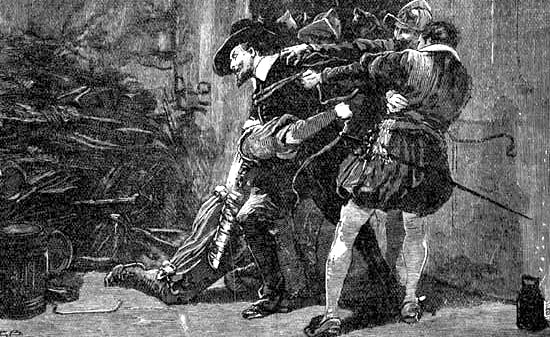There has been no shortage of fanfare about Bank Transfer Day in the financial industry over the last few weeks. Among the hundreds, perhaps thousands of articles circulating online right now about the nascent event, no fewer than 17 different stories have been pumped out by the Credit Union Times alone. Salivating at the opportunities created by a big bank fee-for-all, community-based financial institutions — especially credit unions — have rushed to embrace Bank Transfer Day.
For those who aren’t yet familiar with Bank Transfer Day, the concept grew from a suggestion made by a 27-year-old Los Angeles art gallery owner. In early October, Kristen Christian proposed a broad boycott of big banks, recommending people close their accounts and switch to credit unions on or before November 5, which she dubbed Bank Transfer Day.
“Together we can ensure that these banking institutions will always remember the 5th of November!!” it says on a Facebook page Christian created for the event. “In a stand of solidarity, we will transfer our money and close our accounts with these major banking institutions to take our business to credit unions.”
She calls big banks’ announcement to charge customers $3 to $5 in monthly debit card fees “a blatant attack on ‘the 99%’ that cannot and will not be tolerated.”
“I started this because I felt like many of you do,” Christian wrote. “I was tired…of them using what little money I have to oppress my brothers and sisters.”
“If ‘the 99%’ removes our funds from the major banking institutions to non-profit credit unions on- or by this date,” she continues, “we will send a clear message to the 1% that conscious consumers won’t support companies with unethical business practices.”
Christian has sent out over 350,000 Facebook invitations for Bank Transfer Day. So far, some 60,000 people have accepted her challenge.
So what does all this mean for the thousands of community banks and credit unions in the U.S., those who would be the most obvious benefactors of Bank Transfer Day? Certainly smaller financial institutions across America will see some lift in new accounts throughout the fourth quarter, but it’s unlikely much credit will be owed to Bank Transfer Day. There’s nothing necessarily wrong with the concept — inciting people to switch and send a message about fees. But Bank Transfer Day possesses a number of shortcomings — four to be precise — that will keep the event from achieving its potential.

Are You Ready for a Digital Transformation?
Unlock the potential of your financial institution's digital future with Arriba Advisors. Chart a course for growth, value and superior customer experiences.

Industry Cloud for Banking from PwC
PwC’s Industry Cloud for Banking applies our deep industry knowledge to your specific business needs
1. The Date
Look at your calendar. November 5 is a Saturday.
How many financial institutions — particularly smaller ones like the credit unions that fee-fleeing customers have been told to seek — are closed Saturdays? At least one in three. How many only have drive-through hours but no lobby hours? How many are staffed at a level to handle a flood of new customers?
Thank goodness Bank Transfer Day wasn’t scheduled last year, when November 5 fell on a Sunday.
Sarah Snell Cooke, editor of the Credit Union Times, fiercely defends the Saturday event. “Credit unions are supposed to serve their members and potential members and if these people have the time to jump ship from a big bank to a credit unions, it will likely be on a Saturday,” she said.
But create the inconvenience stemming from having do something “on- or before” any date? What difference does it make when someone makes the switch, as long as it’s convenient for them? BofA’s new debit fees don’t take effect until next year, so why rush to meet an arbitrary deadline?
Now of course, Bank Transfer Day supporters are quick to point out that people are instructed to switch “on- or before November 5th.” But it’s not a question of whether Saturday is the appropriate day for this type of event or not. There is simply no good reason to constrain a national bank switching holiday to a single day, regardless of whether it be scheduled for a weekday or weekend. Why not give people a week? Why not a month?
2. The Backstory
Guy Fawkes, a man who is largely regarded as a terrorist, is shown here apprehended by the King’s men just prior to his torture and execution for treason.
Christian says she chose the date of the inaugural Bank Transfer Day for its historical connection to Guy Fawkes Day, a British holiday held on (not “on or before”) November 5th. It was on that day in 1605 that Guy Fawkes was arrested for attempting to blow up the House of Lords, a crime for which he was subsequently tortured and put to death. Over the centuries, this odd celebration has evolved, starting at first as an annual commemoration of Fawkes’ failure, with dashes of weird anti-Catholicism thrown in. Today, Guy Fawkes Night is celebrated as a festive, social occasion across England. It’s gone from burning effigies of Fawkes to not much more than a good excuse to set off fireworks.
So why would an event like Bank Transfer Day be linked to 17th century Anglo folklore? What’s the connection between Guy Fawkes and Bank Transfer Day? Nothing. Absolutely nothing.
“Guy Fawkes had the courage to take on a towering giant, just as we are,” Christian explains.
Umm, yeah but… he failed! People hate him for what he did, and he was executed for it. The holiday named in his honor is a celebration of how his diabolical plan to install a Catholic monarch was thwarted. His is a day that will live infamy.
And yet at the same time, Christian says she hopes Bank Transfer Day will “give a new name to the 5th of November — not as a failed terrorist attack but as Americans standing up and saying we’ve had enough.”
So which is it? Should Bank Transfer Day supporters see Guy Fawkes as an inspiration who should be admired? Or a terrorist everyone should all condemn and forget?
Christian’s contradictions about her creation and its origins don’t stop with Guy Fawkes. In one breath, she explains that seeing TV reports of police cracking down on Occupy Wall Street protesters inspired her to take action against megabanks, but then sharply points out she isn’t affiliated with the OWS movement, despite her generous usage of OWS class warfare language like “the 99%.” At the end of the day, she supports them, and they support her. But she stresses there’s no connection between the two. Even though the Bank Transfer Day folks are lending their logo to the Occupy Wall Street movement in no less than 29 different cities.

3. The Name
The call-to-action embedded in the name “Bank Transfer Day” is weak. Instead of a raucous call to arms — something like “Tell Your Bank To Shove It Day” — we’re left with the considerably more mealy “Bank Transfer Day.” The name completely lacks any of the passion that should be imbued in this event.
Someone who is mad as hell, someone who isn’t going to take it anymore… they don’t want to just “transfer banks.” They’d prefer to send a message with their middle finger rather than with a polite handshake and a gracious fare-thee-well.
Besides, what is a “bank transfer” anyway? Isn’t that something a customer does between bank accounts, like moving money from their savings to checking account?
There are so many better, catchier, more relevant options that could have been adopted instead. As Ron Shevlin suggests: “CU Later Banks Day,” “Break the Bank Day,” Spank Your Bank Day.” Other ideas include “Flee the Greed” and “Buck Your Bank.”
4. The Logo
The only bright side to the logo selected for Bank Transfer Day is that very few people will see it. As a symbol of defiance, or a visual icon representing the notions underlying Bank Transfer Day, the mask gets an F.
The mask itself comes from the 2006 movie “V for Vendetta,” inspired by Guy Fawkes’ story. In the film, the protagonist wears a mask while using terrorist tactics to fight a totalitarian society.
A very strange range of inspiration. LEFT: The mask worn by the protagonist in “V for Vendetta.” CENTER: The Bank Transfer Day logo. RIGHT: Theatre masks reminiscent of the bank bashing holiday.
While there is a patriotic overtone expressed in the red-white-and-blue color palette, the rest of the logo is simply horrible. Its conceptual significance links back to the bizarre Guy Fawkes story, while also giving the impression of theater masks. Besides its poor quality and confusing posterization, there is zero relevance to the big bank backlash.
“Who came up with that picture?” asks Ron Shevlin. “It looks like The Joker from the Batman series and movies.”
Banks Need No Help Triggering Their Own Run
Bank Transfer Day isn’t likely to push very many people to close their bank account. Those who were going to switch banks would have done it anyway, with or without an organized event. All Bank Transfer Day does is let folks who are pissed about new debit card fees “send a message” by venting collectively.
Even if all the folks who have accepted Christian’s invitation to “attend” Bank Transfer Day were BofA customers, the impact would be minimal — a paltry 0.12% of the bank’s customer base. BofA was probably anticipating losing as many as one million customers from its fee hikes. What’s 60,000 customers here or there?
Indeed by the time November 5th comes along, credit unions will already have minted tens of thousands of members from the ranks of ex-bank customers, many of whom will have never heard of Bank Transfer Day. Doubt it? Ask the people opening new accounts in the next few weeks if they ever heard of Bank Transfer Day. Bet they haven’t. But they probably have heard of the $5 fee coming at BofA. Or the $3 fee at Wells Fargo. Or the $4 fee at Regions. Or the $5 fee at SunTrust. Or any of the other myriad of fees big banks have rolled out recently. Most people aren’t switching financial institutions over a sense of semi-socialistic injustice. They just don’t want to pay for something they are used to getting free.
Who knows, you could be witnessing the peak of switching activity right now, this week. Two weeks from now on November 5, procrastination and indifference may have taken over impetus and outrage.
Ultimately, Bank Transfer Day’s present value lies entirely in its role as a PR hook. The media is happy to publish articles about populist anti-bank, fee-fleeing protestors who are switching to credit unions. And since every journalist assumes no one knows what a credit union is, they dutifully explain the structure and benefits of financial cooperatives.
If something like Bank Transfer Day were to ever really take off in the credit union industry, it would need the support of trade associations like CUNA. But alas, the credit union lobby group has its hands tied; they can’t be associated with anything that could be interpreted as trying to spark a run on banks — that would be bad political juju. Credit unions, with no champion to lead their cause, will have to fight for themselves.
Much like the Occupy Wall Street movement, Bank Transfer Day feels like it wants to be a full blow revolution. But in the annals of history, this event will probably be regarded as little more than a minor bank customer uprising. Sort of like the Move Your Money campaign.









